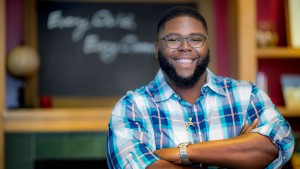GAMBIER, Ohio — What does it mean to be a lower-income student at an elite college or university? Sociologist Anthony Jack, assistant professor of education at Harvard University, addresses this question in a virtual conversation hosted by Kenyon College on Wednesday, Jan. 13, at 7 p.m. ET.
In his remarks, Jack will discuss how class and culture shape the ways in which undergraduates navigate college by exploring the “experiential core of college life,” those too often overlooked moments between getting in and graduating. He will explore how inequality is reproduced by contrasting the experiences of the “Privileged Poor” — lower-income students who graduate from boarding, day and preparatory high schools — and the “Doubly Disadvantaged” — lower-income students who graduate from public, typically distressed high schools. Following his remarks, Jack will participate in a Q&A moderated by Kenyon College President Sean Decatur.
“As Anthony Jack so aptly highlights through his work, differences in socioeconomic backgrounds can have a profound effect on how students experience college,” Decatur said. “Access to higher education is an urgent national conversation, and even more so now given inequalities exacerbated through the COVID-19 pandemic. But in many ways, inclusion in campus culture presents the greater challenge. I look forward to virtually welcoming Dr. Jack to Kenyon as we continue our work to make our own campus community more accessible and inclusive.”
Jack is the author of “The Privileged Poor: How Elite Colleges are Failing Disadvantaged Students,” a book published in 2019 that reframed the conversation surrounding poverty and higher education. Drawing on interviews with 103 undergraduates and two years of observing everyday life at an elite university, Jack interrogated the social and personal costs of exclusion that have implications for undergraduates’ objective opportunities and their social well-being. His research has been cited widely in major media outlets including the New York Times, the Washington Post, the Boston Globe and NPR. This online event is free and open to the public. Visit calendar.kenyon.edu for more information.
